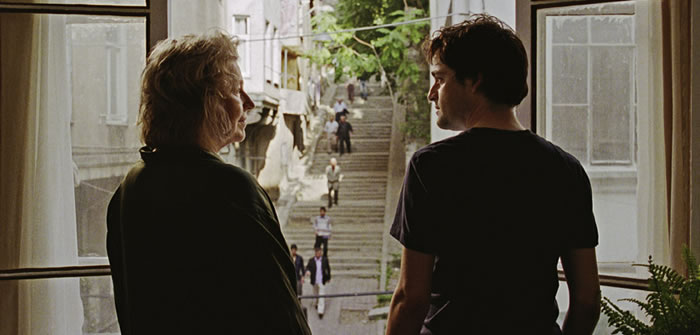In the opening scenes of The Edge of Heaven, retired widower Ali sees a solution to loneliness when he meets prostitute Yeter. Ali proposes to the fellow Turkish native to live with him in exchange for a monthly stipend. Ali’s bookish son Nejat seems disapproving about his bully father’s choice. But the young German professor quickly grows fond of kind Yeter, especially upon discovering most of her hard-earned money is sent home to Turkey for her daughter’s university studies. The accidental death of Yeter distances father and son even more, emotionally and physically. Nejat travels to Istanbul to begin an organized search for Yeter’s daughter Ayten. He decides to stay in Turkey and trades places with the owner of a German bookstore who goes home to Germany. What Nejat doesn’t know is that 20-something political activist Ayten is already in Germany, having fled the Turkish police.
Alone and penniless, Ayten is befriended by German student Lotte, who is immediately seduced by the young Turkish woman’s charms and political situation. Lotte invites rebellious Ayten to stay in her home, a gesture not particularly pleasing to her conservative mother Susanne. Ayten ends up arrested and confined for months while awaiting political asylum. When her plea is denied, Ayten is deported and imprisoned in Turkey. Passionate Lotte decides to abandon everything to help Ayten. In Turkey, Lotte gets caught up in the frustrating bureaucracy of the seemingly hopeless situation of freeing Ayten. A chance bookstore meeting will lead her to becoming Nejat’s roommate. A tragic event will bring Susanne to Istanbul to help fulfill her daughter’s mission. Emotional moments spent with Susanne will inspire Nejat to seek out his estranged father, now residing on Turkey’s Black Sea coast.
The Edge of Heaven (AUF DER ANDEREN SEITE) is Fatih Akin’s fifth fiction feature and makes its world premiere in Competition at the 2007 Cannes Film Festival. 2005’s Crossing The Bridge – The 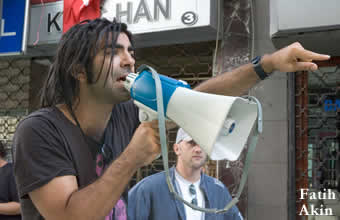 Sound of Istanbul, presented the variety of music found in contemporary Turkey. 2003’s Head-on (GEGEN DIE WAND) won the Berlinale Golden Bear, as well as Best Film at the German and European Film Awards.
Sound of Istanbul, presented the variety of music found in contemporary Turkey. 2003’s Head-on (GEGEN DIE WAND) won the Berlinale Golden Bear, as well as Best Film at the German and European Film Awards.
Fatih Akin was born in 1973 in Hamburg of Turkish parentage. While studying Visual Communications at Hamburg’s College of Fine Arts, he wrote and directed his first short in 1995: Sensin – You’re The One (SENSIN – DU BIST ES!), which received the Audience Award at the Hamburg International Short Film Festival, followed by Weed (GETUERKT, 1996). His first feature, Short Sharp Shock (KURZ UND SCHMERZLOS, 1998), won Locarno’s Bronze Leopard and the Bavarian Film Award for Best Young Director
Bijan Tehrani: The storytelling in The Edge of Heaven reminds me of the structure of One Thousand and One Nights. How much of old Eastern storytelling has influenced your work?
Fatih Akin: First of all, I think I’m a classical storyteller. This was my first desire when I learned how to make a film. That’s how it started. One Thousand and One Nights is a kind of a world that is really like my childhood. My parents used to tell us fairy tales and other folk tales, and it was not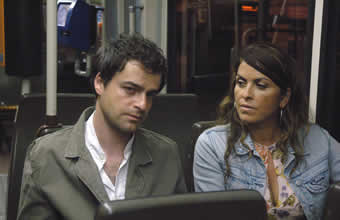 something that I discovered in a later part of my life or career. So whatever can be linked to stories like One Thousand and One Nights is really, very deep inside of me. It’s a part of my childhood.
something that I discovered in a later part of my life or career. So whatever can be linked to stories like One Thousand and One Nights is really, very deep inside of me. It’s a part of my childhood.
BT: In a world where materialism and capitalism run everything, your characters go in search of love and truth. To me, they are changing their life’s direction and leaving everything behind to discover something new. Is that true? Is that something you wanted to show?
FA: Yes. My characters are all outsiders in a way — society outsiders like prostitutes and political refugees. Even being a German professor is kind of being an outsider. Being out of the society and not being in the mainstream makes them outsiders. All of them are moving on in a way and every character has to make a transformation. That was the idea. Characters begin with this certain state of mind and by the end of the film they have changed their opinions and positions. I think this explains me in a way; I’ve changed my mind 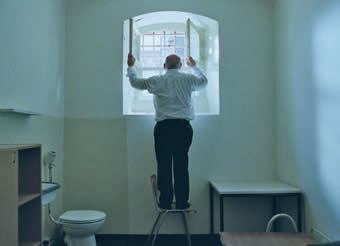 so much. So what does it mean? Am I an adult person or not? Am I a wise person or not, you know? I think my identity is always changing and moving. Identity is not a treasure that once you find it you keep it for the rest of your life.Because of circumstances it’s changing and I try to explain that. So now this film poster behind me is upside down, you know? So it has changed. Before I came here, the poster was not upside down. You see what I mean? Everything is constantly moving and changing.
so much. So what does it mean? Am I an adult person or not? Am I a wise person or not, you know? I think my identity is always changing and moving. Identity is not a treasure that once you find it you keep it for the rest of your life.Because of circumstances it’s changing and I try to explain that. So now this film poster behind me is upside down, you know? So it has changed. Before I came here, the poster was not upside down. You see what I mean? Everything is constantly moving and changing.
BT: I found open circles in the directions your characters take. Nejat goes to Turkey and replaces the book shop owner and in his turn the bookshop owner replaces him at the University and at the end, Ayten and Lotte end up living together and Nejat goes to find his father. It’s not like circles with absolute completion-and-return, these circles seem to be moving towards their starting point, but they are actually ending up in new places. Is that a true understanding of the way your characters move in the film?
FA: Circling—that’s right. I believe that history moves in circles. When you see the history of human beings, you don’t only see certain mistakes that they made. They make a number of mistakes over again but they end up learning. It’s the same with a story in a way; once a “circle” has been completed, people go back to where they are coming from, but it’s not their ending point. It’s the ending point of the film. I wanted my film constantly interact with the audience so that when they leave the theater , my film moves out with them and help them to keep the story alive. This film is not so much about going back to your roots. I’m not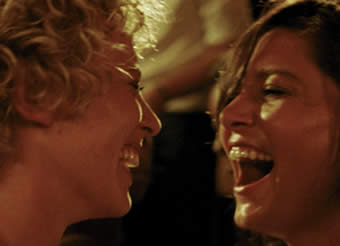 interested in that. Many people understand it like that, and that must be my mistake.
interested in that. Many people understand it like that, and that must be my mistake.
BT: I don’t see it like that. Your characters all go on different journeys.They are trying to find a way out.
FA: Yes, it’s a quest. I share the same destiny. When I went to Turkey—especially to the village where the film is ending, in search of my grandfather—I saw some faces of kids and I saw my own face in them. I saw some behaviors and I saw my own behaviors in them, but I’m not living there. I live so far away. I won’t move there or stay there, but it’s enough to find these similarities. Same with Nejat; he goes to find it. It’s where he is coming from, but it’s not like this going-back-to-your-roots movement.
BT: When the German mother goes Turkey to be in a place where her daughter has lived and died—It’s like her quest at the beginning of her life to go to India.
FA: Through the daughter, the mother comes back to her youth. That’s the idea of it. She has to live through that pain to come back to her youth and to come back to where she went out, and she makes a circle. She comes back there again. It’s not a true circle, in a way, because life has changed her over time.
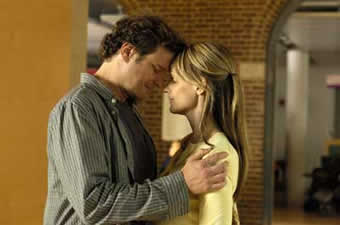 BT: I think that the only characters that don’t want to change and find more about life in the movie are the two religious fanatics that threaten the prostitute. They were the only ones that did not go through any quest.
BT: I think that the only characters that don’t want to change and find more about life in the movie are the two religious fanatics that threaten the prostitute. They were the only ones that did not go through any quest.
FA: The two fanatics, yes, they just appear on the edge. It would be interesting to do a movie about those characters and about how they would change. It’s like going from one extreme to another extreme. It would be an interesting story to tell about people who were extremely conservative.
BT: You have many references to the Kurdish minority movement in Turkey in The Edge Of Heaven. How challenging was it to address this subject in the film? Did you shoot those parts in Turkey?
FA: Well first of all, in the film it’s never mentioned that Ayten and her mother have Kurdish origins. The Kurdish minority is looked down upon by some. I tried to be neutral with that, and I even cast a very popular Turkish actress, who is not Kurdish, for the part. But if you ask my personal opinion about the current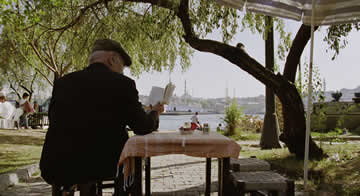 issue, it’s a question that is not solved yet in Turkey—Minority oppression is still not solved. When you are born as a Turkish kid in Germany, you are born as an outsider; you are born as a minority. When you are born as a minority somewhere, you have a very unique experience. I have sympathy with every kind of minority all over the world that has been through oppression. Minorities exist everywhere and have similar experiences. You see what I mean?
issue, it’s a question that is not solved yet in Turkey—Minority oppression is still not solved. When you are born as a Turkish kid in Germany, you are born as an outsider; you are born as a minority. When you are born as a minority somewhere, you have a very unique experience. I have sympathy with every kind of minority all over the world that has been through oppression. Minorities exist everywhere and have similar experiences. You see what I mean?
BT: How did you choose the cast? Was there a certain way you worked with them?
FA: I was an actor before I became a filmmaker, so I think that helped a lot. To have some kind of experience and understanding of what an actor is going through. I know about the fears of actors, you know? I was very open with my actors; I would not force them to certain emotions. I have always tried to interact with my actors; I don’t try to be the boss. Sometimes they have better ideas than what I have written on paper. It’s very instinctive how I choose actors. 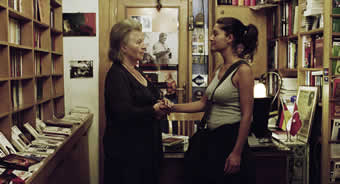 It’s like musicians who play certain melodies. It’s like I just have a feeling that this actor might be right. In this particular film, since I have 6 main actors, I had to work hard to find a balance and pair them well together.
It’s like musicians who play certain melodies. It’s like I just have a feeling that this actor might be right. In this particular film, since I have 6 main actors, I had to work hard to find a balance and pair them well together.
BT: Did The Edge Of Heaven have any screening in Turkey?
FA: It was screened at the Antalya Film Festival and domestic film festivals. I was there during the screening. I was very curious about the response of the audience so I paid attention to those watching. I felt that they liked the film in a way. I felt that somehow, for the most part, the film worked.
I won 5 awards from the national jury there: Best Director, Best Supporting Actress, Best Supporting Actor, Best Editing, and Second Best Film. The critics’ reviews were mixed—the film was very polarizing, but people went to see the film, so it was kind of a success in Turkey. I purposely tried to make the film so that no political institutions could instrumentalize this film for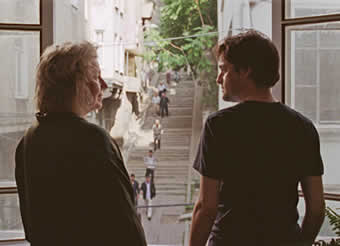 themselves. I tried to keep the film neutral, and many people aren’t used to this; it is out of the ordinary.
themselves. I tried to keep the film neutral, and many people aren’t used to this; it is out of the ordinary.
BT: I think it’s a problem when you don’t come from true democracy; you want people to be on your side. Even here, you have a problem where people expect you to have a specific position on every issue. One thing that is amazing about your film is how you keep discovering more about what’s going on with your characters and the world they live in. Watching The Edge of Heaven is like watching a beautiful scenery—you can watch it many times, but you don’t get tired. I had two people watching this film with me and they weren’t necessarily fans of intellectual films, but they loved it.
FA: That’s nice to hear, because as a filmmaker, you become somehow intellectual and an intellectual these days kind of sounds like a bad word, because it means that you are far away from the audience; I try to be close to the audience. These are difficult issues, like Turkish Kurds and their struggles, and their importance makes it easier to be close to the audience. Honestly, it’s also important to be entertaining, and I tried to do 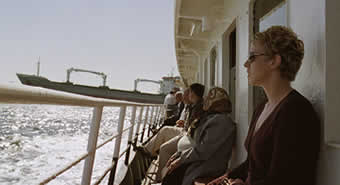 that as well.
that as well.
BT: Lastly, are there any Turkish writers that have inspired you or any that you simply admire?
FA: I have to admit that because I was born, raised, and educated in Germany, I never learned reading or writing in Turkish when I was younger—but I taught myself that later on in life. I have only read translations of Turkish writers, and there is such a small number of Turkish books that exists in other languages; I sometimes became frustrated because I knew that there were so many great Turkish stories and books that I don’t have access to.
BT: Did you ever have an interest in MawlÄnÄ Rumi?
FA: Oh Rumi! I like Rumi and he inspired me very much. You can even say that my film shares many of the ideas of Rumi.

